Friday, 6 December 2013
Tuesday, 12 November 2013
Saturday, 2 November 2013
Monday, 14 October 2013
Thursday, 10 October 2013
Labels:
accent & dialect,
AO2,
AO3,
ethnicity,
powerpoint
MLE or multi-cultural London English
A video by The One Show considering the changing nature of accents/dialects in London.
Tuesday, 1 October 2013
Essay Dos & Don'ts
DO
- GMAP for your intro (AO3)
- Use as many framework terms as possible (AO1)
- Consider sentence functions & sentence and clause structure (AO1 top band)
- Consider representation of events, memories, places, people, situations (AO3)
- Talk about the topics being discussed e.g. semantic fields (AO1 & AO3)
- Refer to relevant theories, concepts & research in the analytical part of the essay (BP1) – (AO2)
- Discuss the issue highlighted in bullet point 2, referring to concepts, theories, research & attitudes.(AO2)
- Explain to the examiners what terms mean or why words are of a particular word class. Just name them with confidence!
- Use a term without giving an example from the text.
- Make sweeping statements e.g. he must be old/he must be uneducated.
- In fact avoid “Must” altogether! Use may/might instead.
- Use the words ‘incorrect’ or ‘wrong’ when talking about variations
- Use the first name of a linguist without his last name e.g. Peter did a study of the Norwich dialect.
- Explain something without saying anything …e.g. and this shows he is from Newcastle (they told you that already!)
Friday, 27 September 2013
D Block Fri 27/09/13
D Block:
Sorry I can't be in today but here's some work you can be getting on with :)
Sorry I can't be in today but here's some work you can be getting on with :)
- If you haven't set up and sent me your blog address yet....please do!
- Find an article about the Rastamouse controversy and post it on your blog. Don't all just pick the first hit on Google. Have a look down the page ... choose a newspaper that appeals to you...
- Once you have posted and read the article I'd like you to comment on it by answering the following questions focusing on representation skills you learnt at AS:
- How is the language issue represented?
- How does the author represent him/herself and others?
- How does the author shape the reader's response (audience positioning)?
- Over the weekend:
- Read the article in the post below on ITV's Tonight survey into accents - the tv programme linked to this new survey can be viewed on ITV player if you search for the Tonight programme.
- Please read the article on MEYD in the extended reading booklet.

As part of a Tonight programme investigating whether social stigma and snobbery still exist towards regional accents, an exclusive poll reveals that more than a quarter of Britons feel they have been discriminated against because of the way they speak.
Watch the programme on ITV this evening at 7.30pm.
The most upsetting moment for me making this film was when some Middlesbrough children confessed to me that they were ashamed of their accents.
Shockingly, they told me they believed their accents would affect their life chances – for the worse.
“We sound right scruffy like,” said young one boy in his football kit. “Not like you: posh. We won’t be able to get proper jobs,” he told me.
Unfortunately - as our Tonight programme shows – he may be right.
For even in modern Britain, where equality is the new God, prejudice about accents is alive and well. And we often found it thriving most - along the north-south, “us and them” fault-lines of old.
Our research not only shows that more than a quarter of Britons (28%) feel they have been discriminated against because of their regional accent but also, according to another batch of research by the law firm Peninsular, that 80% of employers admit to making discriminating decisions based on regional accents.
There is currently no legislation to protect someone from accent discrimination. It is discrimination which experts told me has nothing to do with the way people sound and everything to do with prejudice about the area they come from.

For example, our research shows that the Liverpool accent comes off very badly, as does Cockney and Brummie. “Received Pronunciation” or the “Queen’s English”, on the other hand, reigns supreme.
The Middlesbrough boys said they thought RP sounded “very intelligent” and our research once again suggests that is a widely held view.
Our TV screens are full of RP speakers: in the media, politics and the establishment which reinforce the sense that it is still the “proper way to speak”.
We discovered elocution lessons are on the rise, with many seeking lessons doing so to “soften their regional twang” which they hoped would increase their job prospects
I had thought that with the rise of globalisation and mass media, regional accents would be diminishing. But I was cheered to find this is not the case. Individuality shows no decline.
I was also intrigued to find that our accents are constantly changing – and always have. Our Middlesbrough boys didn’t recognise the accent of their home town from 50 years ago when we played recordings of it to them.
You can listen to voices from your area recorded in the 1950s and 60s via the British Library’s Survey of English Dialects to see how accents have changed even in the last half century.
From Angles and Saxons, Romans and Normans, through the many waves of immigration our islands has seen over the centuries, newcomers to Britain have always brought their own distinct language with them, and as new words and expressions have merged with existing languages so new accents are born.
Today Multicultural London English, or MLE, is becoming the dominant accent in the South East, with sounds and words taken from the Caribbean and African languages.
In a multicultural East End market we found MLE and every other accent celebrated. Every accent in Britain carries stories of its speaker.
Every accent should be celebrated like that, but tragically they aren’t.
We have some of the poorest social mobility in Europe, but even I was shocked to discover that even the way we speak can make children feel like losers – before they really begin life’s journey.
Here are the results of the COMRES survey on regional accents:
Friendliness
- How friendly or unfriendly do you find the following accents to be?
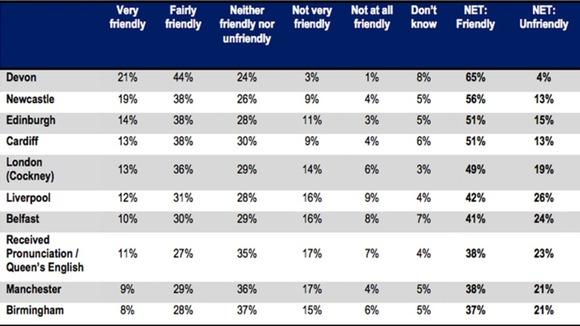
Intelligence
- How intelligent or unintelligent do you find the following accents to be?
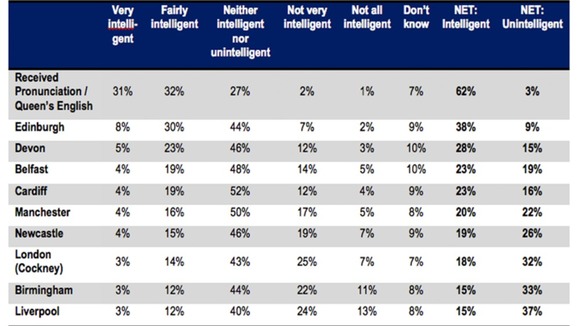
Trustworthiness
- How trustworthy or untrustworthy do you find the following accents to be?
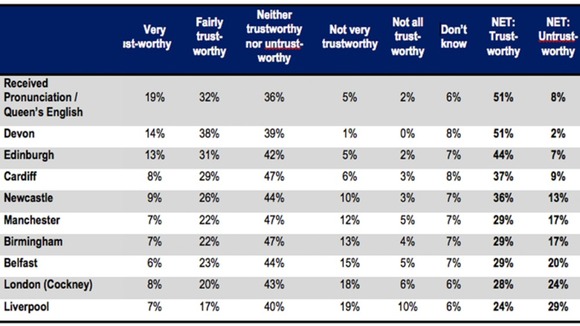
Discrimination
- Do you feel that you have ever been discriminated against in each of the following situations because of your regional accent, or not?
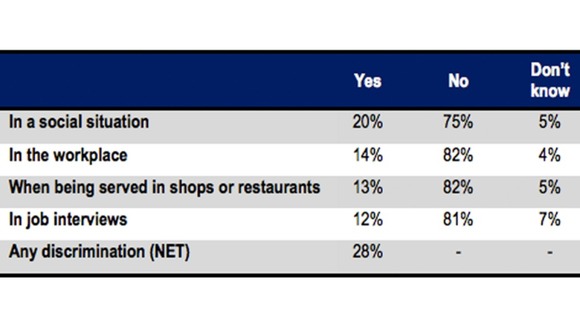
- Have you ever personally discriminated against someone because they had a particular regional accent in any of the following situations?
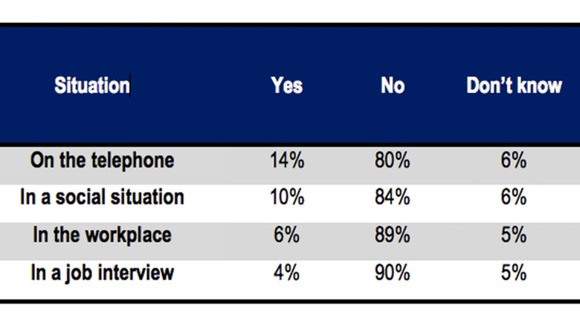
ComRes interviewed online 2,006 GB adults between 2nd and 4th August, 2,014 GB adults between 9th and 11th August, and 2,025 GB adults between 6th and 8th September 2013.
Data were weighted to be representative of all GB adults aged 18+. ComRes is a member of the British Polling Council and abides by its rules. Full results tables can be found at www.comres.co.uk
Wednesday, 25 September 2013
Summary of your views of Mr Oxford Don
Below is a summary of your comments on the poem "Mr Oxford Don".
- Black people are stereotyped through their language "Assault on the Oxford Dictionary"; "mugging the Queen's English".
- People who speak Jamaican creole living in Britain are victimised, ridiculed and stereotyped due to the fact that they don't speak in the way of an "Oxford don" would.
- They are stereotyped as being violent.
- They are made to appear unintelligent.
Saturday, 21 September 2013
Friday, 20 September 2013
Subscribe to:
Posts (Atom)
